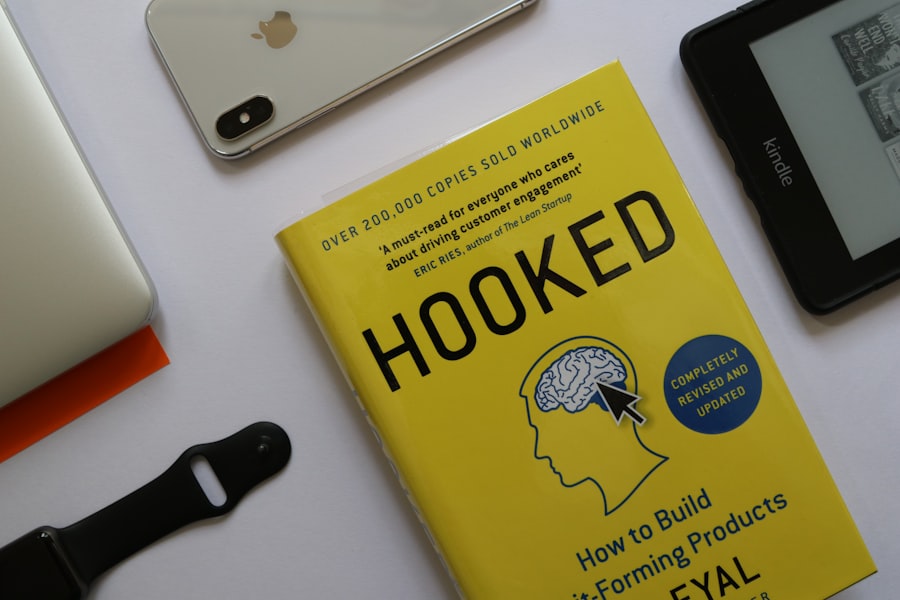As you scroll through your social media feeds, you may find yourself entranced by the endless stream of posts, images, and updates. This phenomenon is not merely a pastime; it is a complex interplay of psychological factors that contribute to social media addiction. At its core, social media addiction stems from the human desire for connection and validation.
You are wired to seek social interaction, and platforms like Facebook, Instagram, and Twitter provide an accessible avenue for fulfilling that need. However, the ease of access can lead to compulsive behaviors, where you find yourself checking notifications or scrolling through feeds far more than you initially intended.
It involves elements of reward systems in your brain, where the anticipation of likes and comments triggers a release of dopamine, the “feel-good” neurotransmitter. This chemical response reinforces your behavior, making you more likely to return to social media for that next hit of validation. Over time, this cycle can create a dependency, where the act of engaging with social media becomes less about genuine connection and more about the pursuit of fleeting gratification.
Understanding this psychological framework is crucial for recognizing the patterns in your own behavior and the potential consequences of excessive social media use.
Key Takeaways
- Social media addiction is driven by psychological factors such as instant validation, dopamine rush, social interaction, and impact on self-esteem.
- Receiving likes and comments on social media triggers a dopamine rush, similar to the effects of addictive substances, leading to a cycle of seeking more validation.
- Likes and comments on social media can have a significant impact on an individual’s self-esteem, leading to a comparison trap and fueling the addiction.
- Peer pressure plays a significant role in seeking likes and comments on social media, contributing to the addictive behavior.
- Social media addiction has been linked to mental health issues, highlighting the need for strategies to break the addiction and prioritize real-life connections.
The Role of Instant Validation in Social Media
Instant validation is one of the most alluring aspects of social media. When you post a photo or share a thought, you often receive immediate feedback in the form of likes and comments. This instant gratification can be incredibly satisfying, as it provides a sense of approval from your peers.
You may find yourself eagerly awaiting those notifications, feeling a rush of excitement each time your phone buzzes with a new alert.
However, this reliance on instant validation can also lead to unhealthy patterns.
You might start to measure your self-worth based on the number of likes or comments you receive, equating your value with your online popularity. This can create a precarious emotional landscape where your mood fluctuates based on social media interactions. The need for constant validation can overshadow more meaningful connections and experiences in your life, leading to a cycle of dependency that is difficult to break.
The Dopamine Rush of Receiving Likes and Comments

The dopamine rush you experience when receiving likes and comments is akin to the high that comes from other addictive behaviors. Each notification serves as a small reward, reinforcing your desire to engage with social media more frequently. You may find yourself caught in a cycle where you post content not necessarily for self-expression but rather for the anticipation of that dopamine hit.
This can lead to an insatiable craving for more likes and comments, pushing you to curate your online persona meticulously. As you become more attuned to this cycle, it’s essential to recognize its implications on your mental health. The pursuit of likes can overshadow genuine interactions and lead to feelings of inadequacy when posts do not receive the expected level of engagement.
This constant comparison can create anxiety and stress, as you strive to maintain an online presence that meets both your expectations and those of your audience. Understanding this dynamic is crucial for regaining control over your social media habits and fostering healthier relationships with both yourself and others.
The Social Interaction Factor in Social Media Addiction
| Factors | Metrics |
|---|---|
| Frequency of Social Interaction | Number of daily interactions on social media platforms |
| Duration of Social Interaction | Average time spent on social media per session |
| Impact on Real-life Social Interaction | Decrease in face-to-face interactions with friends and family |
| Emotional Dependency on Social Interaction | Feelings of anxiety or loneliness when not engaging in social media interactions |
Social media platforms are designed to facilitate interaction, allowing you to connect with friends, family, and even strangers across the globe. This aspect of social media can be incredibly appealing, as it offers a sense of belonging and community. However, the nature of these interactions can often be superficial, lacking the depth and authenticity found in face-to-face conversations.
You may find yourself engaging in small talk or exchanging pleasantries online without forming meaningful connections. This superficiality can contribute to feelings of loneliness and isolation despite being constantly connected. You might scroll through your feed and see others sharing their lives while feeling disconnected from your own reality.
The paradox of social media is that while it offers opportunities for connection, it can also exacerbate feelings of loneliness when those connections lack substance. Recognizing this dynamic is essential for understanding how social media addiction can impact your overall well-being and relationships.
The Impact of Likes and Comments on Self-Esteem
The impact of likes and comments on your self-esteem cannot be overstated. When you receive positive feedback on your posts, it can boost your confidence and make you feel valued. Conversely, a lack of engagement can lead to feelings of inadequacy and self-doubt.
You may start to internalize these reactions, believing that your worth is tied to how others perceive you online. This can create a precarious balance where your self-esteem fluctuates based on the whims of social media interactions. Over time, this reliance on external validation can erode your sense of self-worth.
You might find yourself constantly seeking approval from others rather than cultivating a strong sense of self that is independent of online feedback. This cycle can be damaging, leading to anxiety and depression as you grapple with the disparity between your online persona and your true self. Understanding this relationship between social media engagement and self-esteem is crucial for fostering a healthier self-image.
The Comparison Trap: How Likes and Comments Fuel It

The comparison trap is another significant aspect of social media addiction that can have detrimental effects on your mental health. As you scroll through curated images and highlight reels from others’ lives, it’s easy to fall into the trap of comparing yourself to them. You may find yourself questioning your own achievements, appearance, or lifestyle based on what you see online.
This constant comparison can lead to feelings of inadequacy and dissatisfaction with your own life. The likes and comments on others’ posts often serve as markers of success or happiness in the digital realm. When you see someone receiving an abundance of likes for a seemingly perfect photo or post, it can amplify feelings of envy or self-doubt within you.
This cycle perpetuates a negative feedback loop where you feel compelled to present an idealized version of yourself online in hopes of receiving similar validation. Breaking free from this comparison trap requires conscious effort and self-reflection, allowing you to appreciate your unique journey without being overshadowed by others’ curated lives.
The Influence of Peer Pressure in Seeking Likes and Comments
Peer pressure plays a significant role in shaping your behavior on social media platforms. You may feel compelled to post certain types of content or engage in specific trends simply because others are doing so. This pressure can lead you to prioritize likes and comments over authentic self-expression, as you seek approval from your peers rather than staying true to yourself.
The desire to fit in or be accepted can drive you to conform to societal expectations rather than embracing your individuality. Moreover, the fear of missing out (FOMO) can exacerbate this pressure, pushing you to engage with social media even when it detracts from your well-being. You might find yourself participating in challenges or trends that don’t resonate with you simply because they are popular among your friends or followers.
Recognizing the influence of peer pressure on your social media habits is essential for reclaiming control over your online presence and fostering a more authentic connection with yourself and others.
The Link Between Social Media Addiction and Mental Health
The link between social media addiction and mental health issues is increasingly recognized by researchers and mental health professionals alike. Excessive use of social media has been associated with various mental health challenges, including anxiety, depression, and low self-esteem. As you become more entrenched in the cycle of seeking likes and validation, it’s essential to consider how this behavior impacts your overall mental well-being.
You may find that spending excessive time on social media leads to increased feelings of loneliness or isolation, despite being connected to others online. The constant barrage of curated content can create unrealistic expectations for your own life, leading to dissatisfaction and discontentment. Understanding this connection between social media use and mental health is crucial for developing healthier habits that prioritize well-being over online validation.
Strategies for Breaking the Addiction to Likes and Comments
Breaking free from the addiction to likes and comments requires intentional effort and self-awareness. One effective strategy is setting boundaries around your social media use. You might consider designating specific times during the day for checking notifications or engaging with platforms rather than allowing them to dictate your schedule.
This approach can help reduce compulsive behaviors while allowing you to enjoy social media in moderation. Another strategy involves cultivating mindfulness around your online interactions. Take time to reflect on how certain posts or interactions make you feel—both positively and negatively.
By becoming more aware of the emotional responses triggered by social media engagement, you can make more conscious choices about how you interact with these platforms. Additionally, consider focusing on quality over quantity when it comes to connections; prioritize meaningful interactions with friends and family rather than seeking validation from a broader audience.
The Importance of Real-Life Connections in Overcoming Social Media Addiction
To overcome social media addiction effectively, it’s essential to prioritize real-life connections over virtual ones. Engaging in face-to-face interactions allows you to cultivate deeper relationships built on trust and understanding rather than superficial likes or comments. You might consider scheduling regular meet-ups with friends or family members, participating in community events, or joining clubs that align with your interests.
These real-life connections provide a sense of belonging that cannot be replicated through social media interactions alone. By investing time in nurturing these relationships, you can create a support system that fosters emotional well-being while reducing reliance on online validation for self-worth. Embracing real-life connections allows you to experience genuine moments of joy and fulfillment that transcend the digital realm.
The Future of Social Media and Its Impact on Addiction
As technology continues to evolve, so too will the landscape of social media and its potential impact on addiction. Emerging trends such as virtual reality (VR) and augmented reality (AR) may further blur the lines between online interactions and real-life experiences, potentially intensifying feelings of connection but also exacerbating addictive behaviors. It’s crucial for users like yourself to remain vigilant about these developments and their implications for mental health.
In response to growing concerns about social media addiction, there may also be increased emphasis on promoting digital well-being among users. Platforms may implement features designed to encourage healthier usage patterns or provide resources for those struggling with addiction. As society grapples with the complexities of social media’s role in our lives, fostering awareness around its potential pitfalls will be essential for navigating this ever-changing landscape responsibly.
In conclusion, understanding the psychological underpinnings of social media addiction is vital for recognizing its impact on your life and mental health. By exploring strategies for breaking free from reliance on likes and comments while prioritizing real-life connections, you can cultivate a healthier relationship with social media that enhances rather than detracts from your overall well-being.
The addictive nature of likes and comments on social media platforms can be attributed to the dopamine-driven feedback loop they create, which is similar to the mechanisms involved in other forms of addiction. This phenomenon is explored in detail in an article on Unplugged Psychology, which delves into the psychological underpinnings of social media addiction and its impact on mental health. For a deeper understanding of how these digital interactions can become compulsive, you can read more in the article available at Unplugged Psychology.
LEARN WHY Your Brain Isn’t Addicted to Likes; the Algorithm Gaslights You Daily, Hard.
FAQs
What makes likes and comments addictive?
Likes and comments can be addictive because they trigger the release of dopamine in the brain, which is associated with pleasure and reward. This can create a feeling of validation and social acceptance, leading to a desire for more likes and comments.
How do likes and comments affect our behavior?
Likes and comments can influence our behavior by shaping our self-esteem and sense of social validation. The more likes and comments we receive, the more likely we are to seek out and engage in behaviors that will garner further validation from others.
What are the potential negative effects of seeking likes and comments?
Seeking likes and comments can lead to a preoccupation with social media, a decrease in self-esteem when posts don’t receive the desired engagement, and a reliance on external validation for self-worth. This can contribute to feelings of anxiety, depression, and low self-esteem.
How can we manage our desire for likes and comments?
To manage the addictive nature of likes and comments, it can be helpful to limit time spent on social media, focus on real-life connections and activities, and cultivate a strong sense of self-worth independent of social media validation. Additionally, seeking professional help may be beneficial for those struggling with addiction to social media validation.




